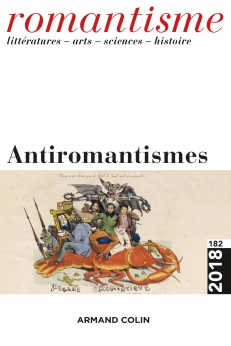
ROMANTISME N° 182 (4/2018)
Pour acheter ce numéro, contactez-nous
Recevez les numéros de l'année en cours et accédez à l'intégralité des articles en ligne.
Les liens de Giraudoux avec la tradition romantique sont avérés. Cependant, au tournant des années 1930, tout en appelant à un « nouveau romantisme », il multiplie les attaques contre la génération romantique de 1830. Celle-ci est accusée d’imposture, d’avoir empêché l’avènement d’un véritable romantisme français et surtout d’avoir laissé la France démunie face à ses problèmes en retranchant l’écrivain de la société. La réflexion de Giraudoux sur le romantisme français s’inscrit en effet dans un cadre plus vaste où se trouve posée la question de la mission sociale et politique de l’écrivain et où est affirmée sa tâche, l’élaboration d’une langue permettant à tous d’affronter le présent. C’est donc au nom d’un romantisme plus large conçu comme conscience intime de la crise que Giraudoux prononce son réquisitoire contre ceux que la tradition scolaire appelle les romantiques français.
The links between Giraudoux and the romantic tradition are well attested. Nonetheless, at the turn of the 1930s, at the same time as he called for a “new romanticism”, he multiplied his attacks against the Romantic generation of 1830. The latter is accused of shamming, of having prevented the birth of a true Romantic movement in France, and especially of having left France to face its problems ill-equipped, by provoking the withdrawal of writers from society. Giraudoux » reflection on French romanticism belongs in effect to a larger context asking what a writer’s political and social mission is and asserting his task to be that of elaborating a language enabling everyone to face their present reality. Thus, Giraudoux berates those whom tradition calls the French Romantics, in the name of a wider conception of romanticism understood as an intimate consciousness of the contemporary crisis.

